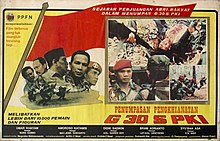
Back Penumpasan Pengkhianatan G 30 S Pki Welsh Pengkhianatan G30S/PKI Hausa Penumpasan Pengkhianatan G 30 S PKI ID Pengkhianatan G30S/PKI Malay Предательство Д30С/КПИ Russian
| Pengkhianatan G30S/PKI | |
|---|---|
 Lobby card | |
| Directed by | Arifin C. Noer |
| Written by |
|
| Based on | The Coup Attempt of the 30 September Movement in Indonesia by Nugroho Notosusanto and Ismail Saleh |
| Produced by | |
| Starring |
|
| Cinematography | Hasan Basri |
| Edited by | Supandi |
| Music by | Embie C. Noer |
Production company | |
Release date |
|
Running time |
|
| Country | Indonesia |
| Language | Indonesian |
| Budget | Rp. 800 million |
Pengkhianatan G30S/PKI[a] ([pəŋxiaˈnatan ˈɡe ˈtiɡa ˈpulʊh ˈɛs ˈpe ˈka ˈi]; Indonesian for Treachery of G30S/PKI) is a 1984 Indonesian docudrama co-written and directed by Arifin C. Noer, produced by G. Dwipayana, and starring Amoroso Katamsi, Umar Kayam, and Syubah Asa. Produced over a period of two years with a budget of Rp. 800 million, the film was sponsored by Suharto's New Order government. It was based on an official history of the 30 September Movement (Gerakan 30 September, or G30S) coup in 1965 written by Nugroho Notosusanto and Ismail Saleh, which depicted the coup as being orchestrated by the Communist Party of Indonesia (Partai Komunis Indonesia, or PKI).
The film depicts the period leading up to the coup and several days after it. In a time of economic turmoil, six generals are kidnapped and killed by the PKI and Air Force, purportedly to pre-empt a coup against President Sukarno. General Suharto destroys the coup and, afterwards urges the Indonesian populace to commemorate those killed and fight against all forms of communism. The film shows the G30S leadership as ruthless and planning "every move to the last detail",[1] taking joy in using excessive violence and torturing the generals, depictions which have been read as portraying "the state's enemies as outside the realm of the human".[2]
The first commercially released domestic feature film to deal with the events of 1965, Pengkhianatan G30S/PKI was a commercial and critical success. It was nominated for seven awards at the 1984 Indonesian Film Festival, winning one, and reached record viewership numbers – although in many cases audiences were required to see the film. The film was used as a propaganda vehicle by the New Order government until its collapse; televised annually on 30 September and became mandatory viewing for students. Since the fall of Suharto in 1998, such use of the film has become less common. Although the film's artistic aspects remain well-received, its misrepresentation of history has been criticised.
Cite error: There are <ref group=lower-alpha> tags or {{efn}} templates on this page, but the references will not show without a {{reflist|group=lower-alpha}} template or {{notelist}} template (see the help page).
- ^ Roosa 2006, p. 98.
- ^ Vickers 2012, pp. 63–64.
© MMXXIII Rich X Search. We shall prevail. All rights reserved. Rich X Search